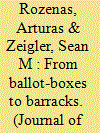| Srl | Item |
| 1 |
ID:
146180


|
|
|
|
|
| Summary/Abstract |
Why do internal wars start anew after they apparently end? I argue that rebel arrangements made for strategic reasons during wars sometimes create provocative effects even after conflicts end; coalitions formed between opposing groups during conflicts often precipitate disruptive commitment problems at the end of wars. This competition can abet the conflict renewal process, especially after wars terminating in military outcomes. Using new data on competitive militant alliances in civil wars, this study probes how rebel rivalries impact peace duration after wars. The evidence indicates that rivalry within coalitions shortens the period of postconflict peace. Wars ending in military victories give way, as many scholars argue, to lengthier periods of peace. But this effect reverses in the context of conflicts characterized by competitive alliances. Indeed, the combination of competitive alliances and a military victory strongly precipitates a resumption of hostilities. This perpetuation of the “conflict trap” proves especially pronounced when rebels win wars. My study implies that peacekeeping or third party forces may find the least local consent for their presence precisely where they matter most in post-conflict environments. As former work has shown, victorious rebels, having wrested power by force from vanquished governments, have relatively little desire for outside interference.
|
|
|
|
|
|
|
|
|
|
|
|
|
|
|
|
| 2 |
ID:
165447


|
|
|
|
|
| Summary/Abstract |
The military often intervenes in politics shortly after elections. This might be because election results reveal information about the ease with which a coup can succeed. Would-be coup perpetrators use this information to infer whether the incumbent can be removed from office without provoking popular unrest. We argue that the informational content of elections depends on the electoral rules that translate votes into outcomes. In electoral systems that incentivize strategic voting, election returns are less informative about the distribution of political support than in electoral systems that incentivize sincere voting. An extensive battery of statistical tests shows that vote-shares of election winners do not predict coup attempts in plurality systems, which encourage strategic voting, but they do predict coup attempts in non-plurality electoral systems, which do not encourage strategic voting. Thus, incumbents who have performed well in elections face a lower risk of coup attempts, but only in institutional environments where voting results are highly informative about the distribution of political support. We apply this logic to illuminate the decisions of the military to intervene into politics during the famous failed 1936 coup in Spain and the successful 1973 coup in Chile.
|
|
|
|
|
|
|
|
|
|
|
|
|
|
|
|